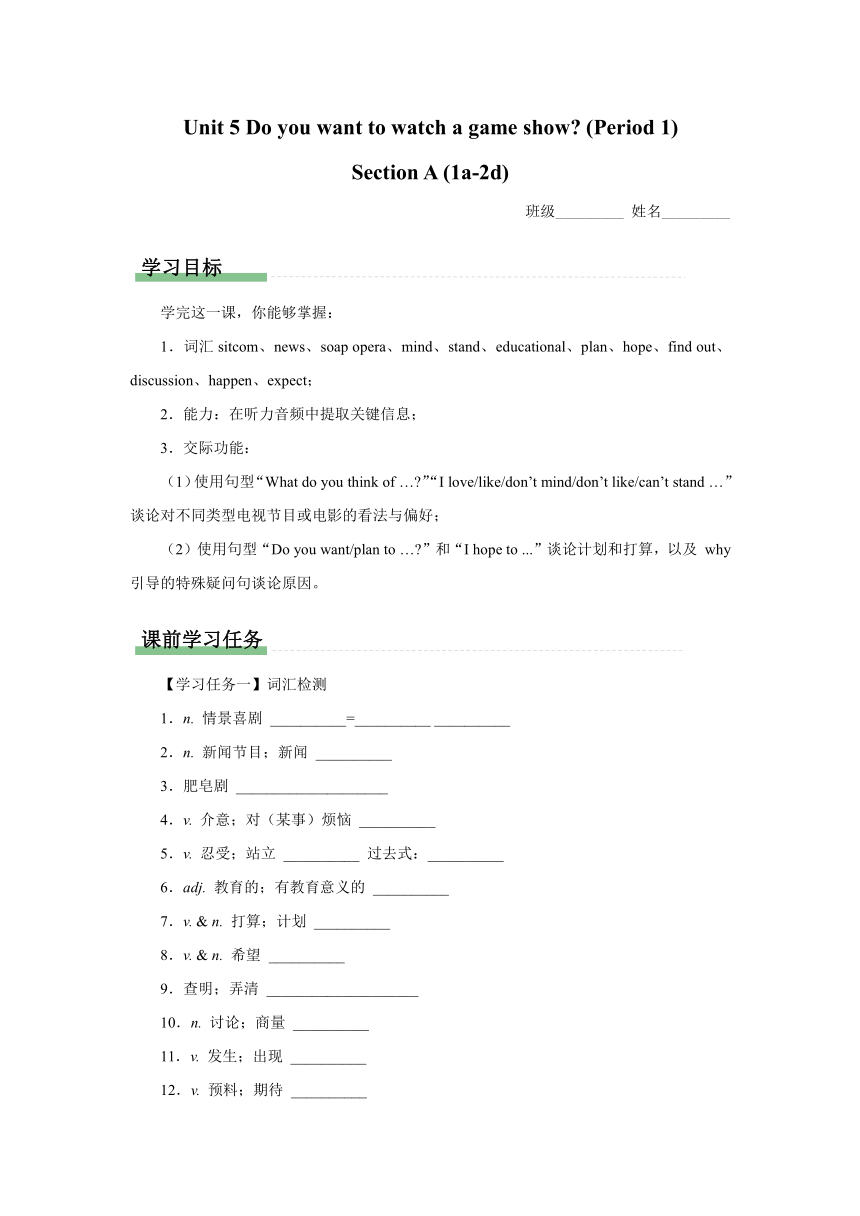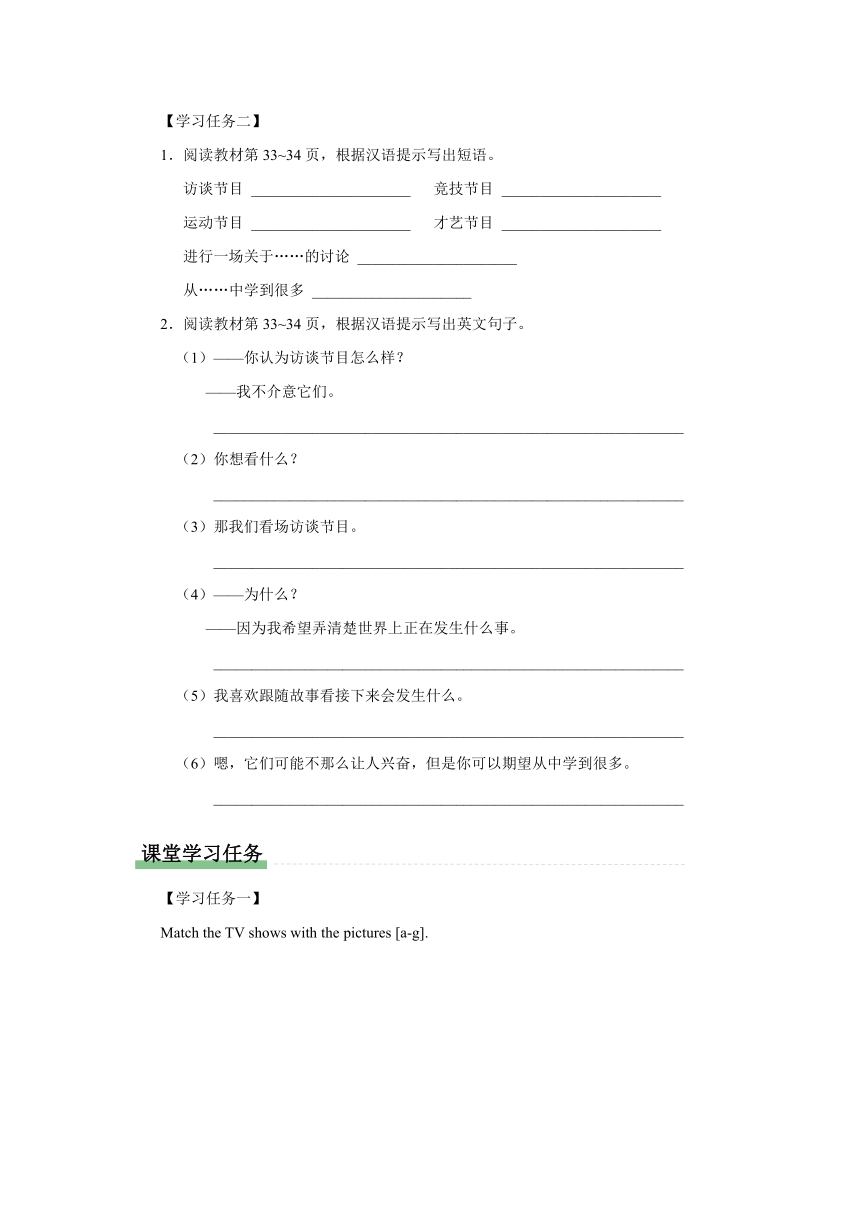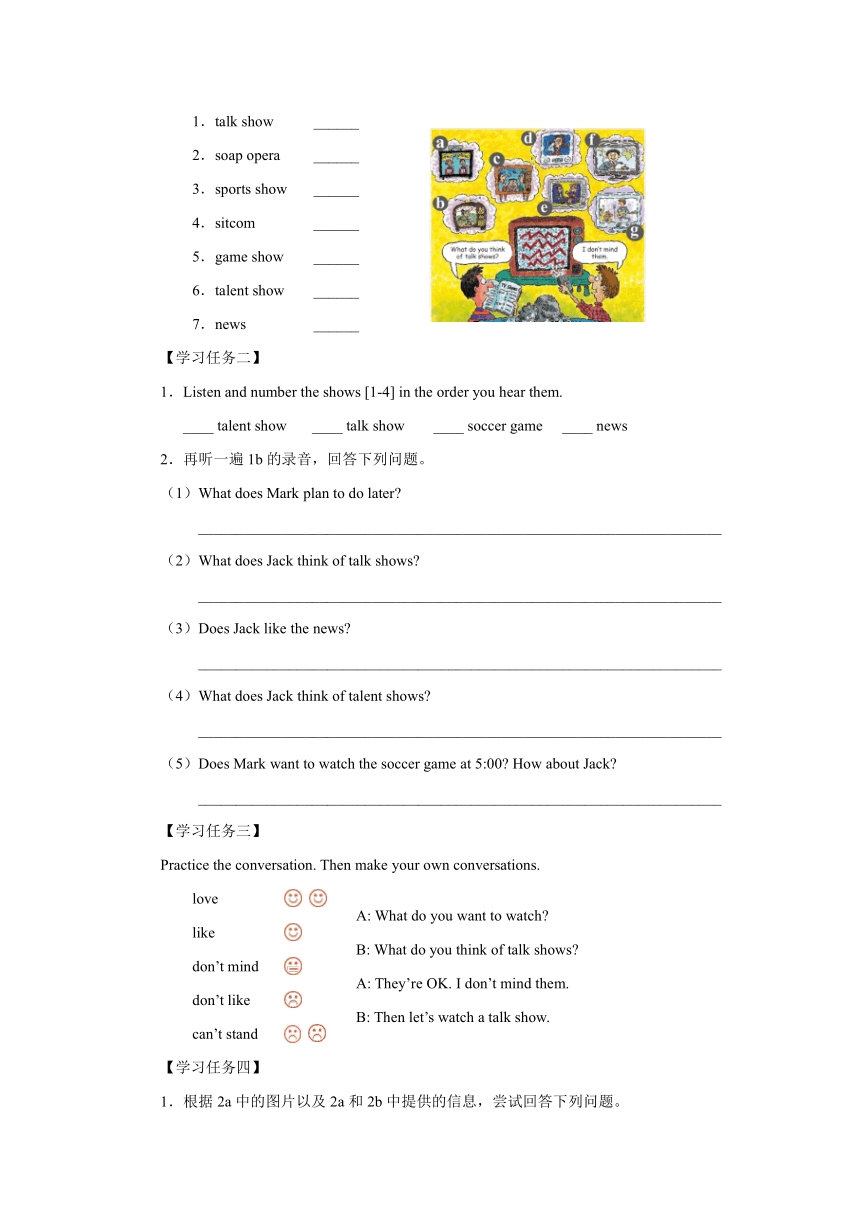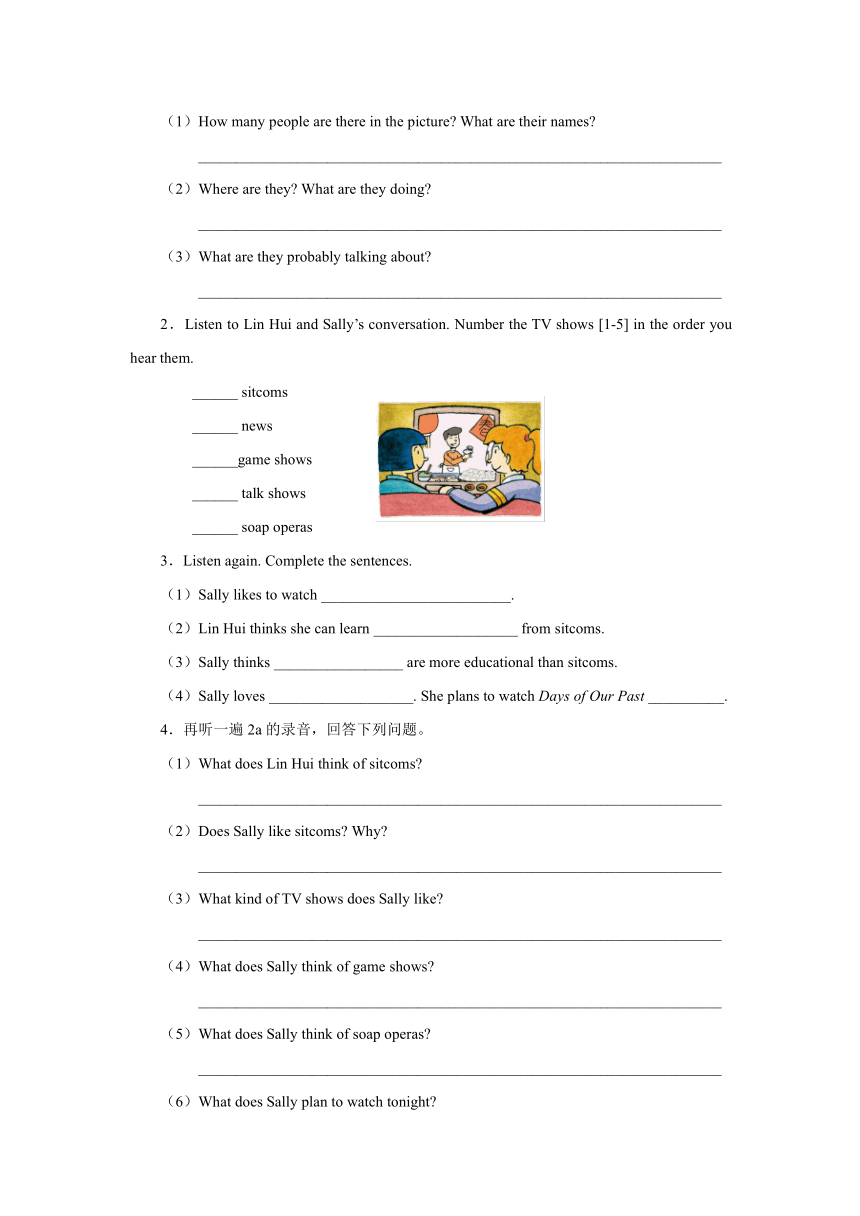Unit 5 Do you want to watch a game show? (Period 1) Section A (1a-2d)预习导学(无答案)
文档属性
| 名称 | Unit 5 Do you want to watch a game show? (Period 1) Section A (1a-2d)预习导学(无答案) |  | |
| 格式 | docx | ||
| 文件大小 | 855.4KB | ||
| 资源类型 | 教案 | ||
| 版本资源 | 人教新目标(Go for it)版 | ||
| 科目 | 英语 | ||
| 更新时间 | 2023-10-01 18:12:16 | ||
图片预览




文档简介
Unit 5 Do you want to watch a game show (Period 1)
Section A (1a-2d)
班级_________ 姓名_________
学完这一课,你能够掌握:
1.词汇sitcom、news、soap opera、mind、stand、educational、plan、hope、find out、discussion、happen、expect;
2.能力:在听力音频中提取关键信息;
3.交际功能:
(1)使用句型“What do you think of … ”“I love/like/don’t mind/don’t like/can’t stand …”谈论对不同类型电视节目或电影的看法与偏好;
(2)使用句型“Do you want/plan to … ”和“I hope to ...”谈论计划和打算,以及 why 引导的特殊疑问句谈论原因。
【学习任务一】词汇检测
1.n. 情景喜剧 __________=__________ __________
2.n. 新闻节目;新闻 __________
3.肥皂剧 ____________________
4.v. 介意;对(某事)烦恼 __________
5.v. 忍受;站立 __________ 过去式:__________
6.adj. 教育的;有教育意义的 __________
7.v. & n. 打算;计划 __________
8.v. & n. 希望 __________
9.查明;弄清 ____________________
10.n. 讨论;商量 __________
11.v. 发生;出现 __________
12.v. 预料;期待 __________
【学习任务二】
1.阅读教材第33~34页,根据汉语提示写出短语。
访谈节目 _____________________ 竞技节目 _____________________
运动节目 _____________________ 才艺节目 _____________________
进行一场关于……的讨论 _____________________
从……中学到很多 _____________________
2.阅读教材第33~34页,根据汉语提示写出英文句子。
(1)——你认为访谈节目怎么样?
——我不介意它们。
______________________________________________________________
(2)你想看什么?
______________________________________________________________
(3)那我们看场访谈节目。
______________________________________________________________
(4)——为什么?
——因为我希望弄清楚世界上正在发生什么事。
______________________________________________________________
(5)我喜欢跟随故事看接下来会发生什么。
______________________________________________________________
(6)嗯,它们可能不那么让人兴奋,但是你可以期望从中学到很多。
______________________________________________________________
【学习任务一】
Match the TV shows with the pictures [a-g].
1.talk show ______ 2.soap opera ______ 3.sports show ______ 4.sitcom ______ 5.game show ______ 6.talent show ______ 7.news ______
【学习任务二】
1.Listen and number the shows [1-4] in the order you hear them.
____ talent show ____ talk show ____ soccer game ____ news
2.再听一遍1b的录音,回答下列问题。
(1)What does Mark plan to do later
_____________________________________________________________________
(2)What does Jack think of talk shows
_____________________________________________________________________
(3)Does Jack like the news
_____________________________________________________________________
(4)What does Jack think of talent shows
_____________________________________________________________________
(5)Does Mark want to watch the soccer game at 5:00 How about Jack
_____________________________________________________________________
【学习任务三】
Practice the conversation. Then make your own conversations.
love A: What do you want to watch B: What do you think of talk shows A: They’re OK. I don’t mind them. B: Then let’s watch a talk show.
like
don’t mind
don’t like
can’t stand
【学习任务四】
1.根据2a中的图片以及2a和2b中提供的信息,尝试回答下列问题。
(1)How many people are there in the picture What are their names
_____________________________________________________________________
(2)Where are they What are they doing
_____________________________________________________________________
(3)What are they probably talking about
_____________________________________________________________________
2.Listen to Lin Hui and Sally’s conversation. Number the TV shows [1-5] in the order you hear them.
______ sitcoms ______ news ______game shows ______ talk shows ______ soap operas
3.Listen again. Complete the sentences.
(1)Sally likes to watch _________________________.
(2)Lin Hui thinks she can learn ___________________ from sitcoms.
(3)Sally thinks _________________ are more educational than sitcoms.
(4)Sally loves ___________________. She plans to watch Days of Our Past __________.
4.再听一遍2a的录音,回答下列问题。
(1)What does Lin Hui think of sitcoms
_____________________________________________________________________
(2)Does Sally like sitcoms Why
_____________________________________________________________________
(3)What kind of TV shows does Sally like
_____________________________________________________________________
(4)What does Sally think of game shows
_____________________________________________________________________
(5)What does Sally think of soap operas
_____________________________________________________________________
(6)What does Sally plan to watch tonight
_____________________________________________________________________
【学习任务五】
Ask and answer questions about the TV shows in 2a. Use information that is true for you.
sitcoms, news, game shows, talk shows, soap operas
A: Do you plan to watch the news tonight
B: Yes, I like watching the news. I watch it every night.
A: Why
B: Because I hope to find out what’s going on around the world.
【学习任务六】
1.听2d的录音,回答下列问题。
(1)What are Grace and Sarah talking about
_____________________________________________________________________
(2)What kind of TV shows do Sarah’s classmates like
_____________________________________________________________________
(3)What does Grace think of game shows and sports shows
_____________________________________________________________________
(4)What does Grace think of soap operas What does Sarah think of them
_____________________________________________________________________
(5)What are Sarah’s favorite TV shows Why does she like them What does Grace think of them
_____________________________________________________________________
2.分角色扮演2d中的对话。
【学习任务七】
小组探究
1.mind 是及物动词,意为“介意;对(某事)烦恼”,后接名词、代词、动词-ing形式或从句。常用于句型“Would you mind (my) _______ ... ”中,意为“你介意(我)做……吗?”。never mind意为“不要紧,没关系”,常用来安慰对方。
2.news 为不可数名词,意为“新闻节目;新闻;消息”。news 在句中作主语时,谓语动词用单数形式。表示“一条消息”用______________。
3.stand 作及物动词,意为“_______”,常与can/can’t/could/couldn’t连用,常用于否定句或疑问句中,后接名词、代词或动词-ing形式。stand 用作不及物动词,意为“_______”。
4._______ ... _______ ... 意为“从……学到……”。learn 也可与 of 或_______连用,意为“听到;得知;获悉;了解”。
5.educational 是形容词,意为“教育的;有教育意义的”。
v. 教育____________→n. 教育工作者____________→n. 教育____________
→adj. 有教育意义的____________
6.plan 作动词,意为“打算;计划”,后接名词、代词或动词不定式作宾语。_____________________意为“计划/打算做某事”。plan 还可用作名词,表示“_______”。 _____________________ “为……制订计划”。
7.hope 作动词,意为“希望”,后面可接不定式或 that 从句,接 that 从句时 that 可省略。hope 后可接 so 或 not,即“I hope so.”或“I hope not.”作简略回答。
辨析:hope与wish
hope wish
hope _______ sth. wish _______ sth.
hope + that 从句(能实现的愿望) wish + that 从句(不易实现的愿望)
hope _______(跟/不跟)不定式作宾语补足语 wish sb. _______ sth.
8.find out 意为“查明;弄清”。
辨析:find out 与 find
①_______ “查明;弄清”,指经过调查、询问、研究后搞清楚、弄明白,后常跟宾语从句;
②_______ “找到;发现”,通常强调寻找的结果。
9.discussion 是名词,意为“讨论;商量”。have a discussion about ... 意为“进行(一次)关于……的讨论”。discuss 是动词,意为“讨论”,其常用搭配为 __________________ “和某人讨论某事”。
10.happen 是不及物动词,意为“发生;出现”。常用结构:sth. happen(s) ______ sb. “某人遭遇了某事”。
辨析:happen 与 take place
①___________强调某事发生的偶然性;
②___________表示事先安排或有准备的事情或活动发生。
11.expect是及物动词,意为“预料;期待”。其常见搭配:
①expect + n./pron. 期待……
②expect + (sb.) _________ sth. 期待(某人)做某事
③expect + 从句 预计/料想……
12.one day 意为“有一天”,可以表示过去的某一天,也可以表示将来的某一天。___________意为“某一天”,表示将来的某一天,可与 one day 互换。
请根据本课所学内容,列出关键词或画出你的思维导图吧!
采访你的好朋友(3~4人),看看他们周末喜欢看什么电视节目以及喜欢的原因,填写下面的表格,并根据表格内容写一份报告。
People Programs Reason
Report:
__________________________________________________________________________________________________________________________________________________________________________________________________________________________________________________________________________________________________________________________________________________________________________________________________________________________________________________________________________________________
Section A (1a-2d)
班级_________ 姓名_________
学完这一课,你能够掌握:
1.词汇sitcom、news、soap opera、mind、stand、educational、plan、hope、find out、discussion、happen、expect;
2.能力:在听力音频中提取关键信息;
3.交际功能:
(1)使用句型“What do you think of … ”“I love/like/don’t mind/don’t like/can’t stand …”谈论对不同类型电视节目或电影的看法与偏好;
(2)使用句型“Do you want/plan to … ”和“I hope to ...”谈论计划和打算,以及 why 引导的特殊疑问句谈论原因。
【学习任务一】词汇检测
1.n. 情景喜剧 __________=__________ __________
2.n. 新闻节目;新闻 __________
3.肥皂剧 ____________________
4.v. 介意;对(某事)烦恼 __________
5.v. 忍受;站立 __________ 过去式:__________
6.adj. 教育的;有教育意义的 __________
7.v. & n. 打算;计划 __________
8.v. & n. 希望 __________
9.查明;弄清 ____________________
10.n. 讨论;商量 __________
11.v. 发生;出现 __________
12.v. 预料;期待 __________
【学习任务二】
1.阅读教材第33~34页,根据汉语提示写出短语。
访谈节目 _____________________ 竞技节目 _____________________
运动节目 _____________________ 才艺节目 _____________________
进行一场关于……的讨论 _____________________
从……中学到很多 _____________________
2.阅读教材第33~34页,根据汉语提示写出英文句子。
(1)——你认为访谈节目怎么样?
——我不介意它们。
______________________________________________________________
(2)你想看什么?
______________________________________________________________
(3)那我们看场访谈节目。
______________________________________________________________
(4)——为什么?
——因为我希望弄清楚世界上正在发生什么事。
______________________________________________________________
(5)我喜欢跟随故事看接下来会发生什么。
______________________________________________________________
(6)嗯,它们可能不那么让人兴奋,但是你可以期望从中学到很多。
______________________________________________________________
【学习任务一】
Match the TV shows with the pictures [a-g].
1.talk show ______ 2.soap opera ______ 3.sports show ______ 4.sitcom ______ 5.game show ______ 6.talent show ______ 7.news ______
【学习任务二】
1.Listen and number the shows [1-4] in the order you hear them.
____ talent show ____ talk show ____ soccer game ____ news
2.再听一遍1b的录音,回答下列问题。
(1)What does Mark plan to do later
_____________________________________________________________________
(2)What does Jack think of talk shows
_____________________________________________________________________
(3)Does Jack like the news
_____________________________________________________________________
(4)What does Jack think of talent shows
_____________________________________________________________________
(5)Does Mark want to watch the soccer game at 5:00 How about Jack
_____________________________________________________________________
【学习任务三】
Practice the conversation. Then make your own conversations.
love A: What do you want to watch B: What do you think of talk shows A: They’re OK. I don’t mind them. B: Then let’s watch a talk show.
like
don’t mind
don’t like
can’t stand
【学习任务四】
1.根据2a中的图片以及2a和2b中提供的信息,尝试回答下列问题。
(1)How many people are there in the picture What are their names
_____________________________________________________________________
(2)Where are they What are they doing
_____________________________________________________________________
(3)What are they probably talking about
_____________________________________________________________________
2.Listen to Lin Hui and Sally’s conversation. Number the TV shows [1-5] in the order you hear them.
______ sitcoms ______ news ______game shows ______ talk shows ______ soap operas
3.Listen again. Complete the sentences.
(1)Sally likes to watch _________________________.
(2)Lin Hui thinks she can learn ___________________ from sitcoms.
(3)Sally thinks _________________ are more educational than sitcoms.
(4)Sally loves ___________________. She plans to watch Days of Our Past __________.
4.再听一遍2a的录音,回答下列问题。
(1)What does Lin Hui think of sitcoms
_____________________________________________________________________
(2)Does Sally like sitcoms Why
_____________________________________________________________________
(3)What kind of TV shows does Sally like
_____________________________________________________________________
(4)What does Sally think of game shows
_____________________________________________________________________
(5)What does Sally think of soap operas
_____________________________________________________________________
(6)What does Sally plan to watch tonight
_____________________________________________________________________
【学习任务五】
Ask and answer questions about the TV shows in 2a. Use information that is true for you.
sitcoms, news, game shows, talk shows, soap operas
A: Do you plan to watch the news tonight
B: Yes, I like watching the news. I watch it every night.
A: Why
B: Because I hope to find out what’s going on around the world.
【学习任务六】
1.听2d的录音,回答下列问题。
(1)What are Grace and Sarah talking about
_____________________________________________________________________
(2)What kind of TV shows do Sarah’s classmates like
_____________________________________________________________________
(3)What does Grace think of game shows and sports shows
_____________________________________________________________________
(4)What does Grace think of soap operas What does Sarah think of them
_____________________________________________________________________
(5)What are Sarah’s favorite TV shows Why does she like them What does Grace think of them
_____________________________________________________________________
2.分角色扮演2d中的对话。
【学习任务七】
小组探究
1.mind 是及物动词,意为“介意;对(某事)烦恼”,后接名词、代词、动词-ing形式或从句。常用于句型“Would you mind (my) _______ ... ”中,意为“你介意(我)做……吗?”。never mind意为“不要紧,没关系”,常用来安慰对方。
2.news 为不可数名词,意为“新闻节目;新闻;消息”。news 在句中作主语时,谓语动词用单数形式。表示“一条消息”用______________。
3.stand 作及物动词,意为“_______”,常与can/can’t/could/couldn’t连用,常用于否定句或疑问句中,后接名词、代词或动词-ing形式。stand 用作不及物动词,意为“_______”。
4._______ ... _______ ... 意为“从……学到……”。learn 也可与 of 或_______连用,意为“听到;得知;获悉;了解”。
5.educational 是形容词,意为“教育的;有教育意义的”。
v. 教育____________→n. 教育工作者____________→n. 教育____________
→adj. 有教育意义的____________
6.plan 作动词,意为“打算;计划”,后接名词、代词或动词不定式作宾语。_____________________意为“计划/打算做某事”。plan 还可用作名词,表示“_______”。 _____________________ “为……制订计划”。
7.hope 作动词,意为“希望”,后面可接不定式或 that 从句,接 that 从句时 that 可省略。hope 后可接 so 或 not,即“I hope so.”或“I hope not.”作简略回答。
辨析:hope与wish
hope wish
hope _______ sth. wish _______ sth.
hope + that 从句(能实现的愿望) wish + that 从句(不易实现的愿望)
hope _______(跟/不跟)不定式作宾语补足语 wish sb. _______ sth.
8.find out 意为“查明;弄清”。
辨析:find out 与 find
①_______ “查明;弄清”,指经过调查、询问、研究后搞清楚、弄明白,后常跟宾语从句;
②_______ “找到;发现”,通常强调寻找的结果。
9.discussion 是名词,意为“讨论;商量”。have a discussion about ... 意为“进行(一次)关于……的讨论”。discuss 是动词,意为“讨论”,其常用搭配为 __________________ “和某人讨论某事”。
10.happen 是不及物动词,意为“发生;出现”。常用结构:sth. happen(s) ______ sb. “某人遭遇了某事”。
辨析:happen 与 take place
①___________强调某事发生的偶然性;
②___________表示事先安排或有准备的事情或活动发生。
11.expect是及物动词,意为“预料;期待”。其常见搭配:
①expect + n./pron. 期待……
②expect + (sb.) _________ sth. 期待(某人)做某事
③expect + 从句 预计/料想……
12.one day 意为“有一天”,可以表示过去的某一天,也可以表示将来的某一天。___________意为“某一天”,表示将来的某一天,可与 one day 互换。
请根据本课所学内容,列出关键词或画出你的思维导图吧!
采访你的好朋友(3~4人),看看他们周末喜欢看什么电视节目以及喜欢的原因,填写下面的表格,并根据表格内容写一份报告。
People Programs Reason
Report:
__________________________________________________________________________________________________________________________________________________________________________________________________________________________________________________________________________________________________________________________________________________________________________________________________________________________________________________________________________________________
同课章节目录
- Unit 1 Where did you go on vacation?
- Section A
- Section B
- Unit 2 How often do you exercise?
- Section A
- Section B
- Unit 3 I'm more outgoing than my sister.
- Section A
- Section B
- Unit 4 What's the best movie theater?
- Section A
- Section B
- Unit 5 Do you want to watch a game show?
- Section A
- Section B
- Unit 6 I'm going to study computer science.
- Section A
- Section B
- Unit 7 Will people have robots?
- Section A
- Section B
- Unit 8 How do you make a banana milk shake?
- Section A
- Section B
- Unit 9 Can you come to my party?
- Section A
- Section B
- Unit 10 If you go to the party, you'll have a grea
- Section A
- Section B
